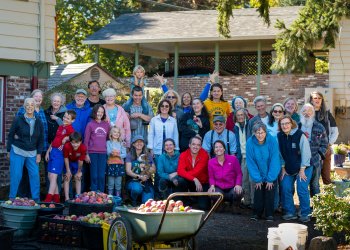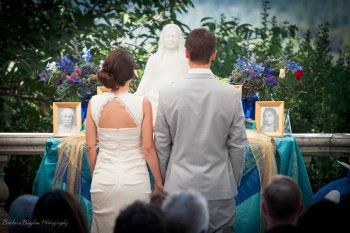At Ananda, we often speak of the blessings that come from living in intentional communities rooted in high ideals and simple living. Paramhansa Yogananda envisioned these “world brotherhood colonies” as models for sustainable living in Dwapara Yuga. As he prophesied, “World brotherhood colonies will spread like wildfire!”

Community creates social connections that have a measurable impact on our health and wellbeing. Small, intentional communities allow for greater shared resources and a lesser impact on the environment. Intergenerational communities make caregiving less isolating and nurture friendships between the young and the old. For Ananda, community most especially supports our desire to center God in our lives.
Rarely will you hear one of us at Ananda speak of the challenges that community living brings to our lives. And yet we know as seekers of Self-realization that challenge is an important catalyst for spiritual growth. So, what are the hardest parts of living in a community? What can we learn from them? How can we overcome them?
Othering
This is one of the more recent criticisms of communities by scholars on the subject. Critics argue that communities, by nature, draw boundaries that create insiders and outsiders. While there’s some truth to this, it’s equally true of families, cultures, or any form of group identity.
Othering is something we must overcome if we are to experience our oneness with the Divine, which is the whole purpose of yoga. In his series of speeches titled, A World Without Boundaries, Paramhansa Yogananda lays out the road map to overcoming this human tendency. We begin, he suggests, within our own selves. We shed light on the prejudices that our personal experiences, family and society lodged within us. We release them in the realization that we are all children of God. Next, we expand our love until we love all the world as our family. To do this, we meditate to expand and uplift our consciousness.
In creating Ananda Village, Swami Kriyananda made it an early order of business to create a retreat center for people to stay and receive what we have to share. This was no accident. Ananda’s early and lasting emphasis on sharing the teachings is a positive, outward pulling force that helps our communities constantly seek to serve others beyond our ‘membership.’ Swami traveled the world, wrote books, lectured publicly, and touched everyone he met with his warm smile. He encouraged us to start schools, businesses, and philanthropic endeavors.
Here in Ananda Portland, we do this through our seva with local nonprofits and, like Swami, with our events, writings, classes and by supporting interfaith events aimed at uplifting consciousness. Community, by its nature, has a boundary yes, but that does not mean we cannot consciously expand ourselves to include others in meaningful and uplifting ways. As Swami says in his book Education for Life, maturity is,”the ability to relate appropriately to other realities than one’s own.”
Collective Over Individual
As a highly individualistic society, the idea that one might place the collective good ahead of our own self interest is seen as oppressive and absurd. And yet, the consequences of this extreme adherence to individual interest is a root cause of our social and environmental crisis today.

I study and teach wild horse behavior for precisely this reason. By understanding the social structure of horses, I see more objectively how a healthy community thrives when the collective good is placed first. Horses have roles, but not hierarchy. The roles exist for the health and safety of the herd. When a lead horse is injured or needs to rest, another will graciously take its place until the original horse is ready to serve. How is leadership assigned? By consensus, the herd follows the horse with the most consistent good judgement.
As with all things, the Buddha’s wisdom applies here, “the middle path is the way.” Through trial and error, those of us living in community learn that we cannot and should not suppress our individuality or abandon our own inner knowing. But we also learn that if we do not consider the impact our decisions have on the collective, for better or worse, we soon find ourselves walking away from our community entirely.
I recall a time when I was working with a mentor in my equine assisted learning practice who said to me, “when you talk about your life, it’s as if Ananda is another person in your nuclear family.” This was an astute observation. What we learn, if we are to make community living last, is that we do well to consider how our personal choices impact the whole because they do. The more we live in that knowing, the more we live congruent with this Divine truth: we are one.
Harmony Over Conflict
When we enter the social contract of community, much like marriage, we discover that what we say matters. There are no take backs. With our spouses and children, we learn very quickly that there are times to speak up, times to listen, and times to live and let live. An excellent rule of thumb offered by Swami Kriyananda when deciding whether to say what you see is this, “Is it true? Is it helpful?”
Through the course of community living we find ourselves faced with opportunities to decide what we will say, to whom, and how. It may be something small, like an annoyance from a neighbor. It may be more significant, like the observance of someone’s risky behavior.
During the pandemic, I sometimes received calls from fellow community members concerned about my choices. My family had created a small pod with a few other households to care for our young children. Though we kept public contact minimal, some still viewed our approach as risky and let us know. I didn’t love receiving those calls—but I reminded myself: this was a friend, afraid. I, too, was afraid. I made the best choices I could for my family, took precautions, and did my best to respond with kindness.
Another horse wisdom mentor of mine once said, “harmony is the resolution of conflict, not its absence.” This hit home as a balance point to the desire to maintain harmony over honesty. It is okay to disagree and have challenging conversations. Just pick your battles with discernment and remember that harmony is the goal. To achieve resolution, we should listen with an open mind and speak with an open heart.
The wedding vows that Swami Kriyananda wrote sum this up exceptionally well, “I will respect your right to see truth as you perceive it, and to be guided as you feel deeply within yourself.”


4 Comments
Hello, Gita.
I really appreciate your writings and what you share!
So profound and also simple at the same time.
We often get in our own way in this physical and spiritual journey. I
would enjoy quoting you on my Facebook pages if you are inclined to allow that privilege. If so, let’s talk!
I know about Ananda from Kent (which you know as Hanuman). I’ve had the delightful pleasure of meeting him at a workshop / presentation of mine last month at Garden Home Library.
I’m looking forward to reading more as I subscribed to the newsletter.
Where would I find the speeches called “A World Without Boundaries”?
It’s in The Divine Romance, which is a compilation of talks by Yogananda published by SRF.
Gita, I appreciate your raising the consciousness of othering. As a community member here at Lynnwood I find this a key to accepting and growing from the variety of people here. It’s the becoming aware of how I “other” that is the point of growth.
Also, I appreciate the importance of remembering that harmony is a process, not to be confused with avoidance.
Such a helpful newsletter which I will revisit a few more times.